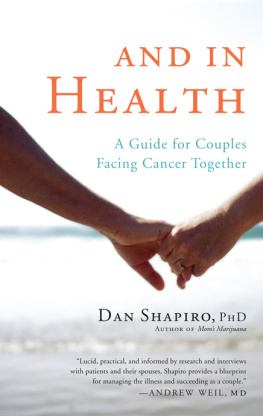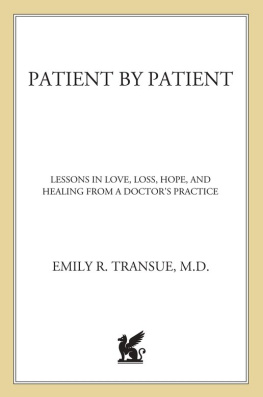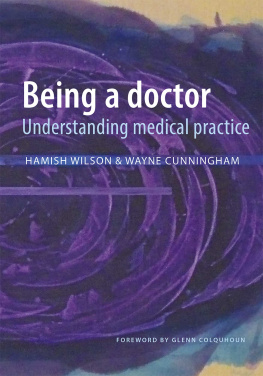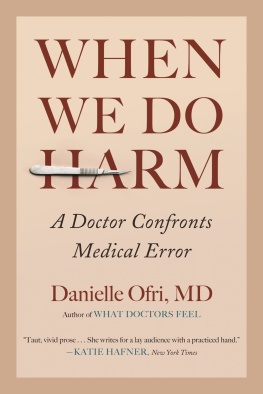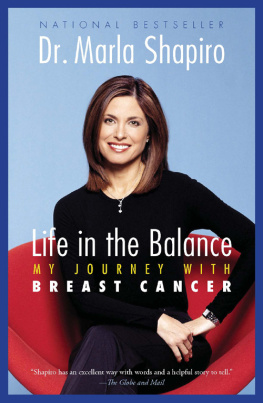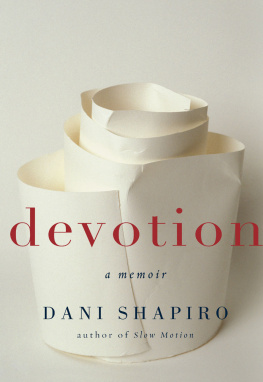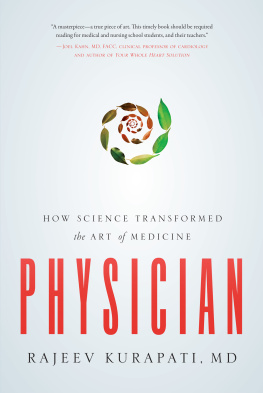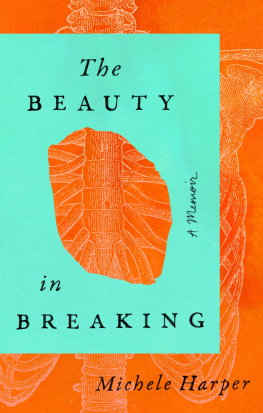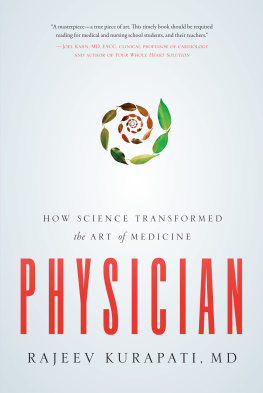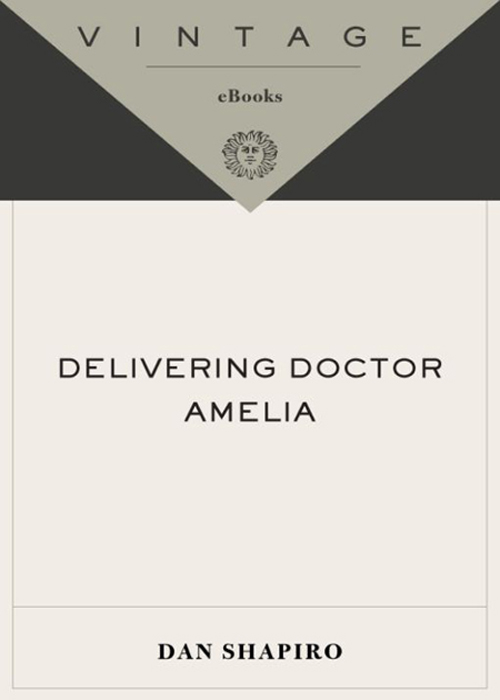
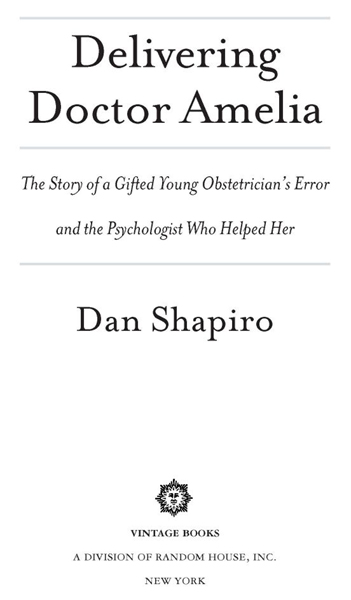
Table of Contents
To my brother, David,
who will always be 10-Boy to me
What shall we think of a well-adjusted slave?
Abraham Maslow
Only the wounded doctor can heal.
Carl Jung
One becomes a therapist because of his own desperation.
Elvin Semrad
ACCLAIM FOR DAN SHAPIROS Delivering Doctor Amelia
There are a few gifted doctors and therapiststhe neurologist Oliver Sacks comes to mindwho manage to bring the narrative skills of a novelist to their discussions of the disorders that plague the human body and spirit. Dan Shapiro... appears to be one of them. Milwaukee Journal Sentinel
Shapiro clearly shines as a gifted physician and an expressive author. His writing ambles competently from page to page, dishing insights in carefully measured, melodic prose. The underlying message is one of human frailty, compassion and a better understanding that we all are somehow responsible for one another. Rocky Mountain News
By plying his own hard-won wisdom at having been both terrified patient and uncertain healer, he succeeds not only in delivering Dr. Amelia but also a compassionate and stirring look at the inner lives of medical professionals. St. Louis Times Dispatch
Dan Shapiro... is a psychologist who specializes in treating troubled physicians. The message is important: Doctors are not omnipotent. As human beings, they sometimes make mistakes and need healing of their own. The Atlanta Journal-Constitution
In a choice reminiscent of Kay Redfield Jamison in An Unquiet Mind, Shapiro writes about his own responses to Dr. Amelias revelation.... Each season, book after book rolls toward the public pregnant with ruin. Here is a rare story about healing that seems earned. The Plain Dealer
Honest and perceptive.... A very sensitive and engrossing medical memoir. Publishers Weekly
[Shapiro] preserves an important message: Doctors are human beings who falter sometimes and must find solace before they resume their lives. The Arizona Republic
A fascinating view of the interactions between a psychologist and his patient during the therapeutic process.... A revealing narrative of self-discovery. Kirkus Reviews
Acknowledgments
I owe.
Most of all I owe my patients, who honor me by allowing me into their lives.
I owe the people who have trained under me: the psychology interns, psychiatry residents, and integrative medicine fellows at the University of Arizona, from whom I have learned so much.
I owe my former clinical supervisors: Harry Grater, Hugh Davis, Jacque Goldman, and Steve Boggs, at the University of Florida. I owe Arthur Klein, Bill Pollack, Walker Shields, and Joe Shay at McLean Hospital. I owe my mentor, Gerry Koocher, at Harvard. I owe Irv Yalom, Viktor Frankl, Elvin Semrad, Carl Rogers, Milton Erikson, and George Kelly, whose writings on the complexities of the human character and clinical practice have profoundly impacted me, and the legion of clinical researchers toiling away to separate science from lore.
The following people helped me by discussing or reading early versions of the manuscript: Ann Jones, Bennet Davis, Siquan Ae Todsen, Hugh Miller, Ken Fox, Kathy Fox, Charles Chuckles Brodsky, C. Eric Schulman, Joshua Sokol, Linda Salas, Gretta Brodsky, and Nicole Schulman.
I owe Deborah Babbie Tussing, Scott Freeman, Ron Wright, and the distance learning associate fellows in the Program in Integrative Medicine at the University of Arizona, who welcomed me into their professional lives.
I owe folks at the Iowa Summer Writers festival, including my teachers, Cecile Goding, Wayne Johnson, and all of the participants.
I am indebted to my writers group, where I have found kindred spirits and terrific writers and thinkers: Diane Senechal, Charlotte Lowe-Bailey, Joanna Dane, and especially Jennifer Lee Carroll.
I owe my friends who read the book when it was nearing completion and who were particularly encouraging: Lois Bursik, Jonas Bromberg, Betsey Bromberg, Lynn Goolsby Coppola, and Audrey Schulman.
Two readers did close, critical reads and were enormously helpful. They are Rochelle Ro Bagatell and Patty Weiss Gelenberg.
I owe Andy Weil, a friend, writer, and brilliant mind, who has been enormously encouraging. I owe Alan Gelenberg, my boss at the University of Arizona, who continued to support me even after I made his life harder by sneaking off the tenure track to see patients and write books.
I owe Shaye Areheart, my editor, whose consistent confidence in my writing has been one of lifes staggering surprises. Thanks also go to the Crown Publishing Group and Jenny Frost, Tina Constable, Sara Kippur, Teryn Johnson, Jean Lynch, Jason Gordon, Fearn Cutler de Vicq, and my independent publicist, Tammy Richards-LeSure. I especially owe Whitney Cookman, who designed the beautiful book jacket.
I owe Judith Riven, my agent, who is editor, advocate, and literary mother.
I owe my parents, Ann and Mark Shapiro, and my children, Alexandra and Abigail Shapiro, for always reminding me of the importance of creativity.
David Shapiro, my brother, has remained my most dedicated reader, having been through the manuscript countless times. He helped with my first book as well, and was particularly skilled at getting me to give up passages that I loved, but that had no business occupying space in the book. For example, during the writing of my first book, Moms Marijuana, I wrote a lovely passage about the Northern Lights and the first people who crossed the Bering Strait. In retrospect, it was horrible stuff. David gently told me I had to get rid of it. During the rewriting of this book we discovered the track changes tool in Microsoft Word. Using track changes, we could e-mail the document back and forth, and I could see, in red, text David thought I should change or edit. During one particularly dark period of editing, when I felt the book was hopeless, I found that David had reinserted the Northern Lights passage in a uniquely bad spot, perhaps to remind me of how far Ive come, or perhaps to torture me in the way that only a brother can. Despite that, I love him and am deeply grateful.
And above all, I owe Terry, who supported me writing at all hours of the day. And who read in the car and in bed late at night, and who put up with me interrupting her to ask questions or to make her read a paragraph, and who drove around during the last twenty minutes of our babysitters time on a cool Tucson night in October and helped title the book. I love her with all my heart.
Authors Note
While writing this book my love of narrative nonfiction has collided with my professional obligation to protect my patients confidentiality. I have tried to be loyal to both professions. I have rendered my patient unrecognizable by disguising details and in a few places have combined the experiences of two patients. In all of my decisions I have labored to preserve my patients core and fundamental issues, as well as the pace, tone, and outcome of our work. My patient is aware of this book and has read early versions; she is satisfied that her confidentiality has been protected and that the story matches important parts of her experience. As a result, I consider most of this work narrative nonfiction, but there are sections that have been fabricated to protect her identity.
The sentiment Im trying to convey was better described by Mark Twain in the opening of
Next page

